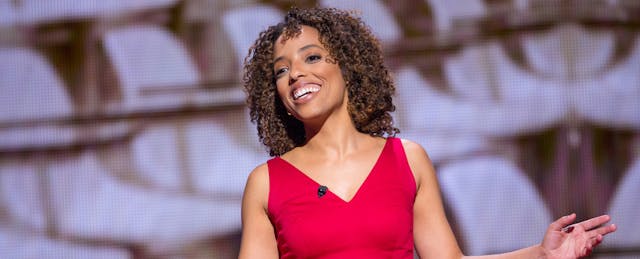A few years ago, I had the great fortune to meet Bronx native Dena Simmons on a fellowship trip and hear about her life’s work and experience. She’s an educator, a TED speaker, and currently, the assistant director of the Yale Center for Emotional Intelligence—not to mention a keynote speaker at the EdSurge Fusion conference later this year.
What I didn’t realize at the time was just how much of a confluence there would be between her work and the current trendiness of one particular phrase: “social-emotional learning” (SEL)—something which Simmons has been exploring and researching for years.
As has happened with other buzzwords in the education space—from “personalized” to “project-based” learning—when a concept gains traction on Twitter or becomes trendy among edtech company offerings, it runs the risk of being mishandled or cheapened. Simmons is well aware of that reality, and has written and spoken about that risk for organizations from ASCD to large public school districts.
Namely, are we at risk of bastardizing SEL to the point where it becomes less helpful and more harmful for the students we seek to serve? How should educators work with kids to truly develop those soft skills—and escape the inevitability of impostor experiences?
Last week, Simmons and I sat down to discuss just that, and more.
From Social-Emotional Learning to Social-Emotional Equity
For the last five years, Simmons has risen through the ranks at the Yale Center for Emotional Intelligence—first starting off as associate director of school initiatives, then moving into a director of education role and finally making it to assistant director.
But for Simmons, her growth isn’t simply driven only by a desire to climb the career ladder. In fact, her work in equity comes from a very personal place. When asked to recall a key memory that defined her as an educator and a human being, she mentions her twin sister, who has a chronic, debilitating illness.
“It really is hard to watch my sister struggle and suffer, but it has really brought out the activist in me, because I’ve had to fight for her since I was young,” she describes. “I’ve had to tell doctors to respect what she’s saying when she’s in pain. It really taught me about how black lives are valued—especially within the chronically sick black folk community.”
As a young girl growing up in the Bronx, Simmons was ever-aware of the importance of personal safety and community. Today, she works with her colleagues to ensure that “our young people have safe spaces to learn”—hence the research and efforts around spreading social-emotional learning and helping students figure out how to navigate and manage their emotions, relationships and well-being.
However, according to Simmons, the world of SEL isn’t all hearts and stars. On the contrary—we are at risk of delivering a “very flawed narrative” when it comes to SEL. Here’s how.
When Social-Emotional Learning Becomes ‘White Supremacy With a Hug’
First, Simmons describes the fact that when SEL is taught to students—particularly students of color—without any context, it can become inherently problematic. “What’s the point of teaching children about conflict resolution skills,” she says, “if we’re not talking about the conflicts that exist because of racism or white supremacy? Without that nuance, she says SEL risks turning into “white supremacy with a hug.”
To help address this issue, Simmons recently wrote a piece for ASCD entitled “Why We Can't Afford Whitewashed Social Emotional Learning,” in which she argues that teaching SEL needs to happen within a sociopolitical and racial context.
“Educators often teach SEL absent of the larger sociopolitical context, which is fraught with injustice and inequity and affects our students’ lives,” she wrote, adding that educators oftentimes “feel ill-equipped and uncomfortable in addressing topics like poverty, gun violence, racism, sexism, homophobia, transphobia, and other forms of injustice that many students, particularly our most marginalized, experience daily.”
Beyond that, the trendiness of SEL is something that also gives Simmons pause—something she recommends practitioners be aware of.
“People’s lives are at stake and so we have to approach anything we do with them—SEL, project-based learning, any of the sort of big names or trendy things—we just have to do it responsibly. We just can’t do it for the sake of doing it,” she states, later adding, “I worry that sometimes because of the trend, we do it for the sake of doing it and not because it could enhance people’s lives.”
Beyond the Defensiveness: Starting with Educator Self-Analysis
At the heart of this all, however, is a need for educators—those folks ultimately in charge of the SEL instruction—to recognize and confront their own internalized racism and sexism, defensiveness and lack of true SEL understanding as it applies to their own awareness and biases.
Simmons, who gives trainings on equitable social-emotional learning to districts and schools across the United States, oftentimes sees that defensiveness and white fragility (a concept first coined by scholar Robin DiAngelo) firsthand.
“The second flawed piece about SEL is [the idea] that some groups of children need it more than other children. When I do SEL trainings, it’s like ‘kids with special needs need this more,’ or ‘our black and brown children need this more,’ as if because they’re not calm enough…” Simmons says. She explored this in a piece she wrote for the Greater Good Science Center.
But what teachers really need to do, she explains, “is to understand themselves, recognize their power and privilege and identity,” and “what that means in the work that they do and the people with whom they often work.”
And that, as Simmons adds, takes humility, time and most importantly, effort.


